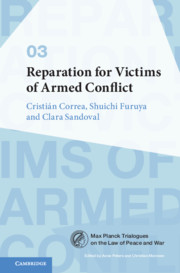Book contents
- Reparation for Victims of Armed Conflict
- Max Planck Trialogues on the Law of Peace and War
- Reparation for Victims of Armed Conflict
- Copyright page
- Contents
- Introduction
- 1 The Right to Reparation for Victims of Armed Conflict
- 2 Operationalising the Right of Victims of War to Reparation
- 3 International Human Rights Adjudication, Subsidiarity, and Reparation for Victims of Armed Conflict
- Conclusion
- Index
- Books in the Series
2 - Operationalising the Right of Victims of War to Reparation
Published online by Cambridge University Press: 03 December 2020
- Reparation for Victims of Armed Conflict
- Max Planck Trialogues on the Law of Peace and War
- Reparation for Victims of Armed Conflict
- Copyright page
- Contents
- Introduction
- 1 The Right to Reparation for Victims of Armed Conflict
- 2 Operationalising the Right of Victims of War to Reparation
- 3 International Human Rights Adjudication, Subsidiarity, and Reparation for Victims of Armed Conflict
- Conclusion
- Index
- Books in the Series
Summary
There is little value in affirming the existence of the right to victims of armed conflict to reparation if it is not clear how massive numbers of victims could access to reparation. The chapter shows how accessibility is essential for guaranteeing this right, offering concrete proposals. As human rights law is an important tool for determining the existence of this right, experiences implementing massive forms of reparation for victims of human rights violations also serve to determine its operationalization. This requires adapting basic notions about the right to reparation designed for addressing individual claims to situations where individualized methods for determining rights will result on the exclusion of the vast majority of victims. The chapter examines the experiences of the UN Compensation Commission and the Ethiopia-Eritrea Compensation Commission, as well as of reparations programs implemented in Guatemala, Peru, Sierra Leone, Colombia, and Chile. It analyses how these policies determined the violations to cover, reparation measures, registering victims, and guaranteeing accessibility of vulnerable victims, women and those frequently excluded. These experiences offer criteria for interpreting notions of proportionality, restitutio in integrum, compensation, and standards of evidence, as well as the relationship with judicial reparation, reconstruction, and development in post conflict situations.
Keywords
- Type
- Chapter
- Information
- Reparation for Victims of Armed Conflict , pp. 92 - 178Publisher: Cambridge University PressPrint publication year: 2020



